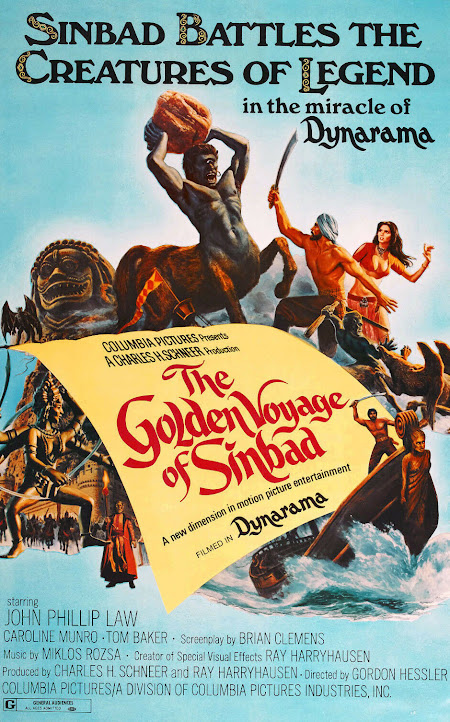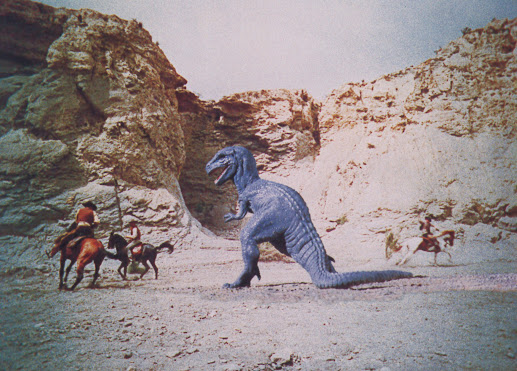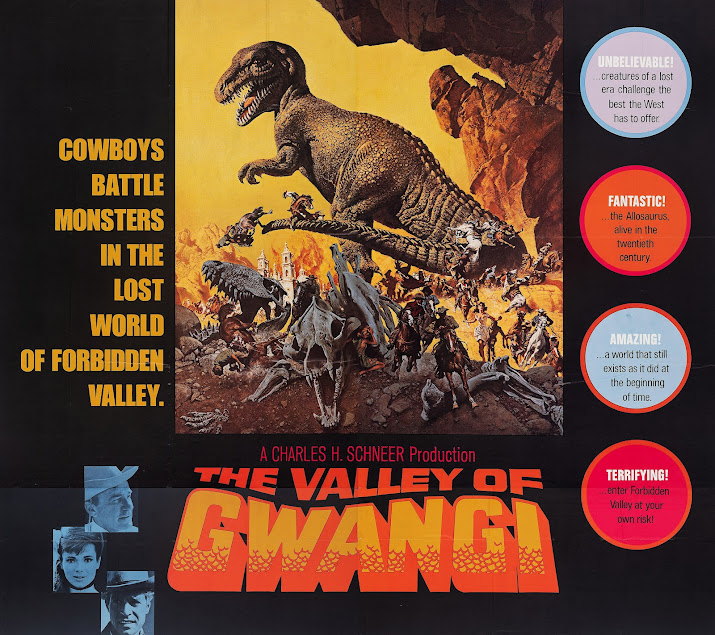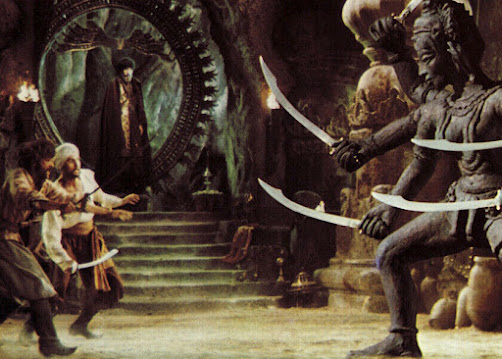Harryhausen Lamp Lit Again
Presentation As Always Makes The Difference
First impressions are often wrong, specifically mine in the seventies of latter-day Sinbad, his Golden Voyage (1974), and Eye of the Tiger (1977). Ignoring the pair for going on fifty years since, finally giving both another go courtesy Indicator Blu-Rays, showed how strict adhere to early formed opinions is a way to miss much that is good, was good all along but for pig-head insistence that a thing once dismissed must forever be so. Golden Voyage this week was the reveal of why it withered in 1974: I had seen it at our wretched College Park Cinema, known burial ground for films better experienced anywhere else. I came away from Sinbad to decry, of all things, Ray Harryhausen for staging fx against too-dark backgrounds … caves, ships at night, wherever light was not. Came long delayed dawn --- the College Park’s projection, like most theatres then and since, was dim to point of invisibility. We had merely adjusted to a lousy standard for watching. Bright lit shows of Smokey and the Bandit sort of got by, but Sinbad unless bathed in sun would not register as it should. Indicator fixes all this, made me know I had unfairly judged Sinbad and its creator. How refreshing to capture a good experience from ash of ones too long thought bad, for reasons peculiar to a single venue and failure to recognize the problem for what it was.
Not saying these are unclaimed classics, but there is plenty to like about 70’s Sinbad. First is Harryhausen skill developed even from favorites that brought him fame. Watching amounts to waiting game between creatures he creates, Easter Eggs spotted through narrative barely got by without them. Fans understood that from start and knew the wait was worthwhile, this more so as we aged and (hopefully) became more patient. “Lesser” Harryhausen is nothing to do with Harryhausen, but with story and what lacks in terms of human participation, his effects top drawer no matter what. Ray rushing a job or doing less than his best was never an option. I reacquainted too with The Valley of Gwangi of long-ago Liberty attendance (1969) where at least the image was discernable (they had a Monte Cristo-like projectionist who seemed never to emerge from his forty-year confinement in the booth). Having rejected more of genre offers by then, I sat a first hour wondering how James Franciscus merited sixty cent admission, dinosaurs when they came largely lost to memory. Clouds upon revisit parted however as with Sinbad, Gwangi clearly off King Kong blueprint, characters/exposition to start, slow trek toward title Valley, then dinosaurs amok to the end, one loose in town to terrorize a la the ‘33 ape, a same scheme using same visual technique, this time in color. I did not sense the borrowing in 1969 but might have appreciated The Valley of Gwangi more given that perception. If we grade films based upon dinosaur content, which all of us should, then Gwangi will punch any ticket, be it sixty cents or whatever Warners wants for its DVD.
Harryhausen’s best support came from composers, specifically Bernard Herrmann, whose magic was potent as Ray’s, and helpful to fill vessel that was story, direction, acting, whenever stop-motion creatures were offscreen. If we credit Herrmann for much of Psycho effect, which most do, then let him take bows for Seventh Voyage/Sinbad, Mysterious Island, Jason, plus a lion’s share for comparative weak sister that was The Three Worlds of Gulliver. Miklos Rozsa stood in to score The Golden Voyage of Sinbad, lending it flavor of long-past The Thief of Bagdad (1940), which Harryhausen knew and loved from childhood, so much so that I’m sure he chose Rozsa for this commission. The Harryhausens really are a continuum from fantasy as presented during the thirties and forties. We could wish Hammer had put Harryhausen in effects charge of their 1965 She remake, as here was exotica he revered since 1935 and the RKO original. To rewrite history further would see Harryhausen manning The War of the Worlds, for which he did preliminarily work, but Paramount in 1953 chose in-house completion, frankly not to imaginative extent he would have brought to the project. I’d enjoy Disney’s 20,000 Leagues Under the Sea better had Ray driven the giant squid instead of WD crew hoisting up a big-scale prop and spending inordinate time and resource to ambulate the thing. Imagine Harryhausen turned loose with even a fraction of money spent here. What a squid sensation he would have composed, plus further monsters lacking as the Nautilus lumbered from sea to sea for 127 minutes.
Critical establishment ignored Harryhausen unduly, wrong-thinking his projects were childish. Maybe they were, and remain so, but soft spine that was stories were never the point, RH set-pieces always a light switched on or off, watchers adjourned to snack bars, loo, or smoking loge until stop-motions restarted. Why not nominate a Harryhausen creation for “Best Actor,” or Actress (his gorgon)? I kid not here. Most people did not understand what Harryhausen went through to achieve his results. I could hardly have walked out of One Million Years B.C. in summer 1966 to explain how Ray did it. I just knew that he had, and we were the happier for watching. B.C. anticipation was so great as to make me attend Mary Poppins two weeks earlier just for being told a trailer for the Harryhausen show would be shown in addition. A reader comment to Greenbriar summed up distinction best: We see Harryhausen fingerprints in the clay. The human factor thrives in all his non-human characters. I’m stunned by their expressiveness, even where I know from past viewings to expect it. Sacrifice for his art obliged the Master to do virtually all of work in private, the better to concentrate and guard secrets of his trade. If it is possible for any of us to leave behind that which will last permanent, Harryhausen did so.
Actor Tom Baker, interviewed for the Indicator Golden Voyage disc, once asked Ray why he stopped after Clash of the Titans, to which RH replied, I didn’t want to be alone anymore. Imagine being shut up in a workspace, by yourself, for year or two it took to complete a feature. Yes, he was there to supervise shooting, but the close job was done solitary. I’ll cop to impatience with Sinbad and the Eye of the Tiger, half through before I began speeding through clunky talk-talk to apply brakes whenever a next monster showed up. Harryhausen movies were determinably G-rated, which caused some to feel they had grown out of the game as 70’s loomed, myself included, but as said earlier, even late ones play OK thanks to Blu-Ray enhance, a surrender to the inner child full accomplished on my part. Extras among the Indicator discs include 8mm versions sold by Columbia for most all the Harryhausen group, eight or so minutes of best stuff for fans to watch over and again at home. These may well have been a best bargain in film collecting at the time.










14 Comments:
Love Harryhausen, and was lucky enough to know him somewhat and have lunch once with he and his wife. Both lovely people. And, talking dinosaurs, Ray was like a kid, even though 70-ish at the time.
I am second to none in my love of Gwangi; I think it's something of a B-masterpiece. Westerns and dinosaurs is an unbeatable combination for me. (And Franciscus is actually pretty good, and certainly easy on the eyes.)
There is an innocence and sweetness to the Harryhausen oeuvre; it's not just that his stuff is fun, but it's fun, innovative and good-natured in a way that the best of mid-century pop entertainment could be. I miss him, and I miss the world that made him.
As for lost opportunities! A Harryhausen John Carter! Or Hammer Hound of the Baskervilles. (And She is a great missed opportunity.) And had Harryhausen been there for the Amicus Burroughs films (especially At The Earth's Core), they might've been mini-masterpieces.
Ah, well....
Like James, my wife and I had a meal with Harryhausen and his wife (Diana?). RH attended a showing of his sculptures at an art museum in Wilmington Delaware. He stayed over at the hotel as did my wife and me and on Monday morning Diana and he insisted we join them for breakfast (Kill me now!)
I was working on my fantasy films book and he graciously lent me a number of stills to use in the book. A sweet guy.
Harryhausen films were always perfect to be included in the Saturday movie marathons that channel 11 always put on the air for more than 20 years. The fact that his films had no movie stars was always a great because the actual star was Harryhausen himself and his work.
I remember seeing CLASH OF THE TITANS in a packed theater being 10, and it was an impressive experience, more to me than STAR WARS. When I later began to find it on TV the impression diminished but not the fondness: I realized some "flaws" of the special effects. But I still love the film.
I had the feeling Harryhausen and Schneer went back to Sinbad for the same reasons Peter Sellers and Blake Edwards went back to the Pink Panther -- It wasn't what they wanted to do, but it's what they could get backing for. So they summoned up professional enthusiasm and delivered two more Sinbads instead of War of the Worlds, or Baron Munchausen, or gargoyles ...
The effects are solid and there are some fresh ideas -- the ape as a cursed human character rather than just another creature; an especially ambitious effort -- but the stories feel weak. Hollywood had wrung out the Arabian Nights pretty thoroughly by then, so the most solid and familiar material had been done to the point of cliche. The final Sinbad plots and characters had to go far afield not to echo too strongly previous sword-and-harem-girl movies.
This is frustrating because a distinguishing feature of many Harryhausen films was worthwhile stuff between set pieces. It was usually well written and performed, and teed up the effects sequences as important instead of merely impressive. "Jason and the Argonauts" is exhibit A, followed by "First Men in the Moon". And "Gulliver" was one of the few adaptations to get beyond Lilliput, offering a clever symmetry between the two kingdoms.
There's an oft-repeated story that the Harryhausens' small daughter wrapped Gwangi in a blanket and carried it around as a baby doll, shocking nice old ladies in the supermarket.
Like both the later SINBADS if for no other reason than, like ONE MILLION YEARS BC., CLASH OF THE TITANS and GULLIVER, my first exposure to them was on the big screen. Saw EYE OF THE TIGER on a double feature with EMPIRE OF THE ANTS. Latter-day Harryhausen teamed with latter-day Bert I. Gordon! Don't jump to conclusions... I enjoyed them both. Interesting comparison of careers though. One guy stretched his imagination, challenged his ingenuity and exhausted his considerable talents to deliver as much WOW as he possibly could with limited resources. The other constantly calculating what was the absolute least he could get away with given the time and money at hand. Both very skilled just, you know, at entirely different things.
Love Harryhausen!!! Thinking there were something like two dozen craftsmen working on MIGHTY JOE YOUNG, and this young Turk figures "I could probably do all those jobs myself if I just stay disciplined." Production designer, concept artist, character designer, sculptor, animator, matte painter, story man... and terrific at each!
Those 8mm Harryhausen reels came as close to just plain wearing out as any films I ever owned. They were always very popular with guys who wanted to watch movies from my collection.
Now you've given me a reason to buy more Indicator titles.
If only Harryhausen had had Robert Graves to write the screenplay for JASON AND THE ARGONAUTS. Then we would have gotten the grown-up version of the story. Still like it but if you have not read Graves or Mary Renault do.
I loathed theatres that nickel and dimed on light.
I spent a fortune on projector lamps for my audiences.Still do. Throw them out about half way through their life.
My first Harryhausen,at the age of six,was a 16mm IT CAME...in a side room of the NCO club at the the local Air Force base near Victorville Calif,probably 1961, followed closely by a Saturday matinee of 7th VOYAGE.. shortly after....I think JASON... and FIRST MEN...were next, almost certainly on TV, which makes the first two extra special, the big screen accenting the special effects, rather than highlighting the limitations of the time.... it was many years before I saw the latter two projected but from 1 MILLION YEARS BC onward, I tried to catch each ASAP upon their release.... looking through IMDB at Ray's filmography,I was surprised by the brevity of the list and the wide range of films he contributed to....
Reg: I had a part-time job as a projectionist when I began my college career. We still used carbon rods back then and THAT was a challenge. When I taught cinema classes I bemoaned the switch to bulbs. I also "ruined" in-theater movies for a lot of kids by pointing out the change-over dot in the upper right of the screen. Once seen, it can never be unseen.
I love seeing the change over dot on public domain movies from the '40s on YouTube. Makes me feel I've gone back in time.
I know that there are people whose movie-watching experience is ruined by the brief appearances of that little round circle in the upper right corner of the picture. For the most part, cue marks have never bothered me, with certain exceptions. A theater where I grew up employed a projectionist who was getting on in years and whose eyesight wasn't what it had once been. When he began having trouble seeing the dots, he started scratching a large "X" into those frames. They were VERY large, covered the screen "Xs". Now those were a distraction. But regular old "built into the print" dots, those I seldom even notice.
Oh, and the cue marks that were punched and scratched into TV prints were sometimes kind of hard to ignore, too. Particularly on well-used prints where the picture would occasionally be almost obliterated by white circles, stars and rings filling every corner of the frame.
Randy -- Many projectionists were grizzled old-timers who had been doing the job since the early days of sound. Lots of them used enormous Xs to mark the cue frame.
These INDICATOR Blu-ray sets are wonderful. If there was an 8mm home movie version it is included. I ordered the Harryhausen set after reading of it here. I already have their CURSE OF THE DEMON and MAD MAGICIAN 3D Blu-ray. While there I saw they have Mae West's films including 1943's THE HEATS ON. I already have all these from Kino except THE HEAT'S ON but the bonus features are superb so I plunked down for that as well. The commentaries on the Kino Mae West films I personally found for the most part wide of the mark (and I mean WIDE of the mark). One called Mae West a "starlet." She was and remains a STAR. Looking forward to this. https://www.powerhousefilms.co.uk/collections/limited-editions/products/the-sinbad-trilogy-le-website-exclusive-5th-anniversary-edition , https://www.powerhousefilms.co.uk/collections/limited-editions/products/mae-west-in-hollywood-1932-1943-le , https://www.powerhousefilms.co.uk/collections/limited-editions/products/the-mad-magician-le , https://www.powerhousefilms.co.uk/collections/limited-editions/products/night-of-the-demon-le , https://www.powerhousefilms.co.uk/collections/limited-editions/products/the-wonderful-worlds-of-ray-harryhausen-volume-two-1961-1964-le , https://www.powerhousefilms.co.uk/collections/limited-editions/products/the-wonderful-worlds-of-ray-harryhausen-volume-one-1955-1960-le . I got in in the nick of time. The SINBAD trilogy is now, like many of these wonderful editions, sold out. Thanks again for bringing this to our awareness.
Fortunately the only Harryhausens I had bought on Blu-ray before reading this post were IT CAME FROM BENEATH THE SEA, EARTH VS. THE FLYING SAUCERS and 20 MILLION MILES TO EARTH. This post gave me the incentive to go after the above listed titles from INDICATOR. Once I got them I wanted the set with MYSTERIOUS ISLAND, JASON AND THE ARGONAUTS and FIRST MEN IN THE MOON. I got those today. Wow! One question. Does anyone know which director wanted Ray Harryhausen removed from the set? Love the bonus 8mm versions.
Post a Comment
<< Home